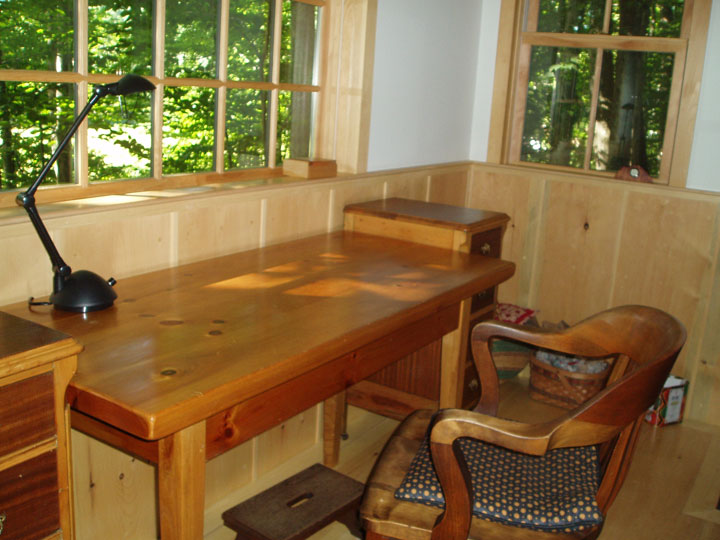 Like Rose Mayer in Into the Wilderness, I came to Vermont for the summer – and stayed. I wanted to write fiction, and the noise of city life made it difficult for me to hear my own voice. Even though I came to Vermont in the summer, winter is the season that matters; it’s winter that dictates my activities for the entire year.
Like Rose Mayer in Into the Wilderness, I came to Vermont for the summer – and stayed. I wanted to write fiction, and the noise of city life made it difficult for me to hear my own voice. Even though I came to Vermont in the summer, winter is the season that matters; it’s winter that dictates my activities for the entire year.
Preparations for winter begin in the spring, which can last a long time in the north. Vermont winter recedes incrementally, and looking out for those early signs is a lesson in acute observation, a necessary practice for good writing. Long before crocus appear, snow fleas announce the onset of spring. Spring is the first whiff of a thaw, a red tinge at the tips of the maples, and the sweet smell of sap rising in a cloud of steam.
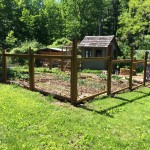 Spring is also a meager moment, when the hairy roots from the cellar and the hoary food in the freezer have lost all appeal. The woolens and fleece that warmed me through winter now itch. I become impatient to garden, and a single warm day can trick me into planting too soon. By the time the incoming tide of green washes across the field, I plunge into the garden, where each seed I plant is as much about next winter as it is about spring.
Spring is also a meager moment, when the hairy roots from the cellar and the hoary food in the freezer have lost all appeal. The woolens and fleece that warmed me through winter now itch. I become impatient to garden, and a single warm day can trick me into planting too soon. By the time the incoming tide of green washes across the field, I plunge into the garden, where each seed I plant is as much about next winter as it is about spring.
We eat the first spinach as if quenching a great thirst, greedy for the harvest. But ready greens quickly become the norm, and we’re soon slaves to the produce that must be harvested, and frozen, pickled or canned against the next year’s cold.
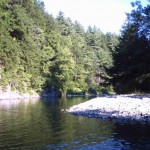 Summer is the swimming season – when dunking into the river washes away the accumulated grime of weeding onions and picking berries. Summers seem luxurious in part because on hot, humid days, we’re rendered limp, and survival is a matter of inactivity in the shade, nursing lemonade.
Summer is the swimming season – when dunking into the river washes away the accumulated grime of weeding onions and picking berries. Summers seem luxurious in part because on hot, humid days, we’re rendered limp, and survival is a matter of inactivity in the shade, nursing lemonade.
The shade and spaciousness of daylight – all these add to the general sense of well being that comes from walking barefoot, momentarily free from the effort of keeping warm. Living in Vermont has given me double vision: I can gaze across the meadow absorbing infinite shades of green while simultaneously seeing the monochrome of winter that was and will be.
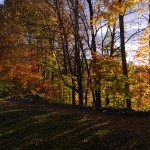 Autumn is always a relief. It’s a season filled with purpose, and the cool weather ends summer’s lassitude. With winter’s deadline approaching, it’s time to finish stacking cordwood, replace screens with storm windows, put snow tires on the car – and return to my desk, where I till the field of my imagination. I contemplate the annual contradiction of sugar maples bursting into flaming beauty only to announce their own death. I gorge on crisp apples and cook slow, complicated, stews.
Autumn is always a relief. It’s a season filled with purpose, and the cool weather ends summer’s lassitude. With winter’s deadline approaching, it’s time to finish stacking cordwood, replace screens with storm windows, put snow tires on the car – and return to my desk, where I till the field of my imagination. I contemplate the annual contradiction of sugar maples bursting into flaming beauty only to announce their own death. I gorge on crisp apples and cook slow, complicated, stews.
Winter arrives. Snow erases the landscape, creating a blank page on which the drama of survival is written in paw prints, scat, feathers, fur and blood. Snow muffles sounds, levels fields, seeps into cracks. Once cold locks up the river, snow erases it. With snowshoes, I walk on water and follow animal tracks.
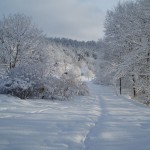 Snow also transforms light, blinding by day and magical by night, when moonlight casts shadows and starlight sparkles. Winter nights reveal the world’s vastness, inviting me to enter the deep, internal places of the imagination. It’s a time to stay warm and tell stories.
Snow also transforms light, blinding by day and magical by night, when moonlight casts shadows and starlight sparkles. Winter nights reveal the world’s vastness, inviting me to enter the deep, internal places of the imagination. It’s a time to stay warm and tell stories.
Into the Wilderness, the first of my novels to be published, is a story about finding a new home and new love; it’s a love song to Vermont. And this blog is a love song for my readers: a compilation of essays about living a rural, rooted life in Vermont.

I envy you so much, I spent two years in Burlington in my adolescence during the 80’s and loved it…I remember the weather was quite different from my native France and I was freezing cold in winter… and I still have vivid memories of the explosion of colors in the fall. A truly amazing state…
Sophie, I love winter – and spring, summer and fall. In Vermont, we have additional seasons: mud season (March), stick season (November) and others. I’ll be writing about them all.
Congratulations on your new blog! I like the view from your writing desk. Vermont looks like a lovely place, but I don’t think I’d want to spend my winters there.
Oh, I love winters here! They’re good for writing and for play – which gives me an idea for a post! Thanks for your good wishes.
I’m always intrigued by others’ creative spaces. The idea of being tucked away in solitude to write is so appealing. Congrats on publishing your first novel–I hope you’ll blog about how that experience came to be, and how it’s working out for you.
Hi Jann,
Thanks for reaching out. It was actually while I was marketing INTO THE WILDERNESS that I discovered blogging, first as a guest blogger on several sites including Live to Write – Write to Live, where I’m now entering my fourth year as a regular contributor. All best.